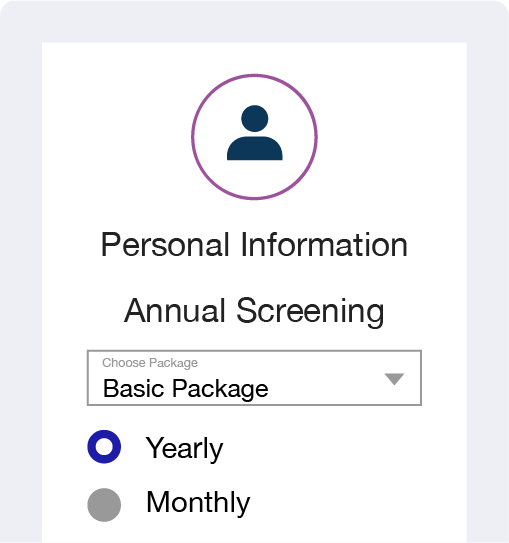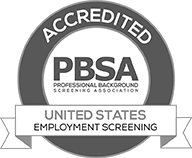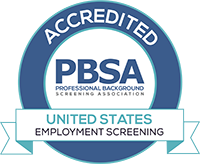Background Checks for the Medical Industry

Don't Hire People Who Are Not Eligible
Most positions in the medical industry require specific levels of education, training and licensing. Hiring someone who is not qualified could lead to improper care being administered. We recommend a custom screening package that includes either FACIS® or an OIG/SAM Sanctions Search. These reports show you if an applicant is prohibited from taking part in federally funded healthcare programs. An extensive criminal background check should also be run on every candidate.
Protect Your Investment With Annual Screenings
Due to the sensitive nature of most medical positions, Background Online recommends annual screenings. These reports inform you if the people who work at your facility incur new criminal records, and help ensure that everyone on your staff remains eligible for employment. Rely on background checks to protect your most important investment: the people you hire to save lives and represent your brand.


Create The Right Screening Package For Medical Employees
The medical industry offers an array of careers and job opportunities. It is important to establish standards and hiring practices for each one. If you are not consistent with screening and other practices, you are taking unnecessary risks. Backgrounds Online offers highly customizable background check packages. Create your own or contact us for help, then save your packages and use them again for upcoming hiring needs.
** Additional third party verification fees may apply.
Medical Industry
Frequently Asked Questions
A: Yes, the law does require background screening for healthcare providers. This is designed to protect patients and their families.
The Affordable Care Act, which was signed into law on March 23, 2010 and upheld by the Supreme Court on June 28, 2012, stipulates that background checks are required for "employees who provide direct care."
A: No, but doing so is strongly recommended.
Background checks give you a deep picture of an applicant's personal and professional past. They show you if a candidate has the proper education and work history for the position to which they are applying. Background reports also show you if a person has a criminal record that you should be aware of before offering a job in a hospital or any facility that provides healthcare services.
A: We recommend regularly screening all medical employees who provide direct care for patients. Annual reports show you if someone in your organization incurs a new criminal record, including misdemeanors, felonies and sexual offenses. They also show important details such as whether or not a person has new traffic violations, credit issues and other relevant records.
A: People who are listed with the Office of the Inspector General (OIG) are sanctioned and/or excluded from participation in all federally funded healthcare programs including Medicare and Medicaid. People who are listed with the System for Award Management (SAM) are sanctioned and/or excluded from being awarded or participating in federal contracts. There are many reasons why someone could be on these lists, including, but not limited to:
- Patient abuse
- Licensing board disciplinary actions
- Failure to repay student loans
Before running an OIG/SAM Sanctions Search, you must obtain permission from the applicant.
A: A Fraud and Abuse Control Information System (FACIS®) search shows you if a healthcare worker has a debarment, probation, letter of reprimand or other action on their record. It is considered to be the "gold standard" for screening healthcare workers and ensuring they are eligible to work in the industry.
A: Backgrounds Online offers all 4 levels of FACIS® reports:
Level 1:
OIG, GSA, DEA, FDA, PHS, ORI, TRICARE and OFAC-SDN data (federal only) and Medicare Opt-Out.
Level 1M:
FACIS® Level 1 plus State Medicaid sanctions, 42 HEAT sources and 51 AG Notice and Release sources, and state level procurement/contractor debarment sources.
Level 2:
FACIS® Level 1 & 1M plus state-level board / source information for one specified state.
Level 3:
FACIS® 1, 1M & 2 and the sanctioning boards from all 56 U.S. jurisdictions across all provider types. This search accesses more than 3,000 sources.
A: The Ban The Box policy will not have much impact on individuals who provide direct healthcare. Federal law requires background checks for healthcare providers, so existing criminal records would be discovered during that process.
People who work in the medical industry, but do not provide direct healthcare, could see an impact from a Ban The Box policy. In the past, potential employees were asked to mark a box if they had been convicted of a criminal offense. In many cases, applications would be automatically rejected if this box was checked. This generally happened before the employer saw specific details about the applicant’s qualifications or the actual conviction.
The goal of Ban The Box is to remove this box from job applications. This gives people who have a criminal record more of a chance to obtain employment. Without it, employers are more likely to learn about an applicant’s education and employment history, along with their other qualifications.
If a candidate has a serious criminal record on file, that fact will still be uncovered via the background screening process.







